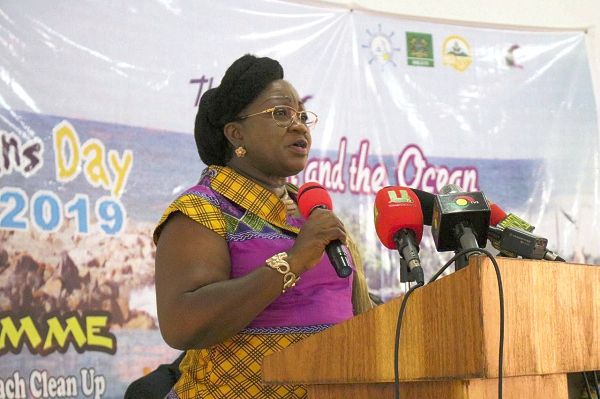
Sea, important national resource, let’s protect it — Patricia Appiagyei
The Deputy Minister of Environment, Science and Technology, Ms Patricia Appiagyei, has called for the protection of the ocean by all, to the benefit of the economy as it remains an important resource for the nation.
She noted that in spite of the importance of the sea to tourism development, fishing, oil exploration and production, its resources were being desecrated by open defecation and plastic waste.
Advertisement
Speaking at a durbar to mark the 2019 World Oceans Day in Tema yesterday, the deputy minister said Ghana’s coastal areas which were for commerce and industrial activities controlled about 25 per cent of the two-thirds of the country’s land mass population.
She said negative attitudes such as littering with plastics that found its way into the country’s oceans, open defecation and the dumping of refuse indiscriminately contributed to polution of the ocean.
The event, dubbed: ‘Gender and the Ocean’ and organised by the Ghana Ports and Harbours Authority (GPHA), was attended by members of the Parliamentary Select Committee on Environment, students of the Marine Resource Department of the University of Ghana, fishers and members of the Fish Trading Association.
Ms Appiagyei expressed regret that open defecation along the coast lines was endemic despite sensitisation campaigns by various institutions.
She said the country could not reap the benefits of the beaches because they did not appear attractive to people, particularly tourists.
Gender issues
Turning her attention to labour in fishing-related activities, Ms Appiagyei said while women constituted half of the labour, they were largely concentrated in low-skilled, low paid and seasonal jobs in the area, and lacked the necessary health, safety and labour rights protection.
She nonetheless expressed regret at the activities of some women in the fishing labour chain, and counselled them to endeavour to protect the sea from plastic and waste pollution.
Ms Appiagyei pointed out that the attainment of the Sustainable Development Goal 14 on conservation and sustainable use of oceans, seas and marine resources for sustainable development was key to gender which required collaboration between men and women to address.
Unregulated development
Ms Appiagyei also stressed that unregulated development of urban settlements and inappropriate waste management practices were pressures that also resulted in habitat pollution and the depletion of living marine resources.
“A global assessment report suggests that there are 165 million tonnes of plastic in the sea today, with some 24 million tonnes being discharged into the sea from various sources, particularly from land-based sources on an annual basis,” the deputy minister said.
The ministry, she announced, was awaiting the Cabinet’s approval of a Draft Policy for Plastic Waste Management to help tackle the issues to protect the marine environment.
EPA
The Deputy Executive Director of the Environmental Protection Agency (EPA), Mr Ebenezer Appah-Sampong, said the EPA was rolling out a programme to engage producers of plastics, following the passage of the Legislative Instrument 2250 on plastic management with a take-back scheme on polyethylene terephthalate (PET) bottles.
“You will find plastics in almost everything, including the clothing we wear, so they have become part of us, but what we can do is to look at some types which are easily disposed of for a possible consideration,” he said.
He added that presently, the EPA was focusing on plastics as a resource where people would be encouraged to recycle them into more usable products “just as we have seen a company at Ashaiman, which has found them useful for creating pavement blocks.”
Mr Appah-Sampong also said the Agency, in partnership with the Ghana Standards Authority (GSA), was developing a number of environmental standards, including standards for municipal sewage treatment facilities, saying “we are resolved to enforce these standards to the letter.”
GPHA
The General Manager in charge of Special Duties at the GPHA, Mr George Berdu, called for a concerted effort among stakeholders to address the waste menace which, he said, had become a canker that could spell doom for people in the fisheries sector, if immediate solutions were not found.
The Tema Mantse, Nii Adjei Kraku II, who was the chairman for the occasion, expressed regret that fishing activities within the Tema Manhean community were no longer lucrative because the sea had been filled with plastics from human activities.
That, he said, had seen the people becoming poorer by the day since their source of livelihood was being eroded.
He called for continual sensitisation and investments by municipal assemblies in beach projects to discourage people from polluting the sea.



